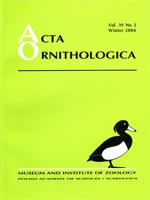The influence of a parasite (larvae of Protocalliphora, Diptera: Calliphoridae) on an avian host (Blue Tit) was studied in 1994–1997 as part of a long-term research project on a population of Blue Tits inhabiting nest boxes on the island of Corsica. The Blue Tit broods were heavily infested with Protocalliphora larvae. The abundance of caterpillars as a key food type for the tits was monitored. A random sample of 16 nests was experimentally subjected to an anti-parasite heat treatment, which resulted in a marked decline in the numbers of Protocalliphora larvae. Untreated nests, with high numbers of parasites, were regarded as control nests. Under the anti-parasite treatment, Blue Tit nestlings were fed less frequently than the control nestlings (8 v. 11 food items per hour per nestling). Significant changes in the diet composition occurred, with parasite-free nestlings being consistently fed with fewer caterpillars. An average parasitised nestling was supplied by its parents with 2.6 caterpillars more than an average parasite-free chick. This suggests that in the highly parasitised control nests, the parent tits made an effort to compensate for the detrimental effects caused by Protocalliphora larvae. Feeding rate and food composition were shown to influence chick condition and survival in the nest. In spite of these facts, the nestlings in parasitised nests developed less rapidly and had lower survival rates than in the anti-parasitically heat-treated nests. The parasitic Protocalliphora larvae have a double effect on their avian host: they adversely affect nestling performance, and they compel adult tits to work harder in order to at least partially compensate for that influence.
How to translate text using browser tools
1 December 2004
Effects of Protocalliphora Parasites on Nestling Food Composition in Corsican Blue Tits Parus caeruleus: Consequences for Nestling Performance
Jerzy Bańbura,
Philippe Perret,
Jacques Blondel,
Donald W. Thomas,
Mireille Cartan-Son,
Marcel M. Lambrechts

Acta Ornithologica
Vol. 39 • No. 2
December 2004
Vol. 39 • No. 2
December 2004
Blue Tit
compensation
diet
ectoparasite
food composition
nestling performance
Parental care




